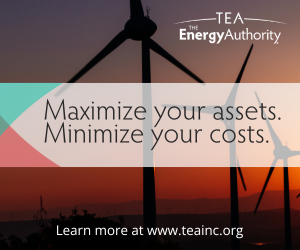Fittingly, the season of thankfulness begins each November when we honor all those who have served our country in the U.S. armed forces. Our heartfelt thanks go out to all those who served and who continue to serve and protect us.
Of course, November is also election season. With the 2024 elections just passed, we may be thankful just to escape the onslaught of endless political advertisements (at least until the next cycle begins). From a national perspective, every election brings both opportunity and challenge. Well ahead of this season of change and transition, we have been strategizing to make sure APPA, with a powerful broad base of local community connections, is ready to advocate in any political landscape. Our webinar on November 20, How the 2024 Elections Will Impact Public Power, is a good place to hear more about the new agenda ahead.

We have learned to be nimble and able to adapt for all circumstances, just like our utility members large and small. In this issue, you will read some informative and compelling stories of how utilities in smaller communities are adapting to meet their customers’ needs.
In the broader world of electric utilities, where investor-owned utilities serve more than 650,000 customers on average, even a mid-sized public power utility would be considered small. About 82% of APPA members have 20,000 customers or fewer, with 50% having 2,000 or fewer customer accounts. Yet our level of reliability, pride in customer service, and meaningful impact within the community is unmatched nationally. Part of the reliability and resilience comes from public power systems of all sizes reaching out to help each other. Out of the large storms this fall, APPA will be awarding around 350 mutual aid commendations to member utilities.
The stories in this issue highlight several ways public power communities are leveraging resources to create new capability at home. They are taking on projects like installing new generation and innovative grid technologies, defending against cyber attacks, and addressing threats to community ownership to keep the value of public power flowing to local residents and businesses. Projects, like the one in Kansas where KPP Energy is partnering to help Hillsboro be a generating city for the first time in decades, or in Montezuma, Iowa, where the utility is working with partners to construct the state’s first renewable community microgrid, or in Sitka, Alaska, where the community is rehabilitating one of its hydroelectric projects, are all inspiring roadmaps to how utilities create value in small communities.
Like the majority of our members, APPA itself is a relatively small association in Washington; we are by far the smallest of the three major electricity trade associations in terms of staffing and funding. But our strength is in numbers, and in the voices of the 54 million people served in thousands of communities throughout the land. In the coming months, we will continue to ensure your voice is heard by sharing your successes and your challenges with those in the various corridors of power, and by demonstrating to them how federal government actions can help or hinder the success of local communities. Thank you for all you do for your communities and for the mission of public power nationally.

